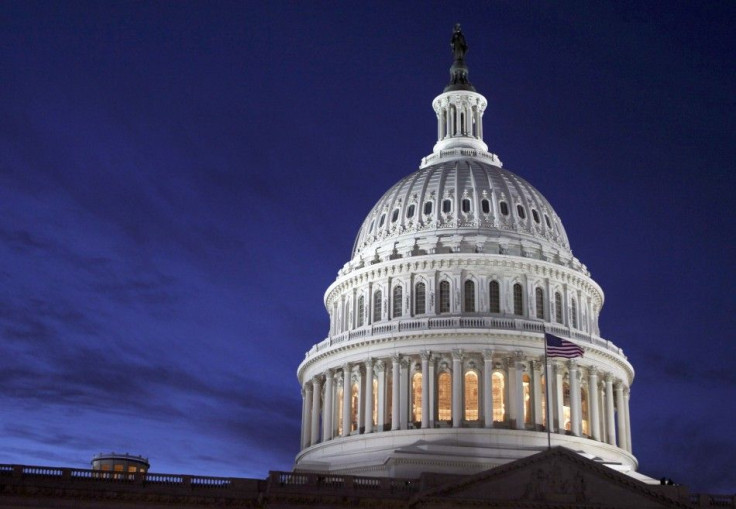House Easily Passes Debt Deal Bill, 269-161; Senate Is Next
Analysis

The House easily passed the debt deal bill, 269-211, early Monday evening, cutting federal spending by up to $2.4 trillion over 10 years, and raising the debt ceiling. The bill now goes to the Senate, where that chamber is expected to vote on it, and pass it, by Tuesday, late afternoon.
If all goes as If all goes as planned, the bill will be on Presiden Obama's desk, and his signature will avert a default by the largest and most technologically advanced economy in the world.
U.S. Rep. Gabrielle Giffords Returns
The House vote also had drama of the real kind -- not just the artificial kind created by the heretofore polarized, rhetoric-spewing two political parties: U.S. Rep. Gabrielle Giffords, D-Ariz., returned to the House floor for the first time since being shot in January. Giffords voted for the debt deal bill.
The House -- both parties -- rose to its feet with jubilant applause and embraced Giffords. And more than a few eyes were most in the chamber. In the end, it took the courage of Giffords to show the feuding Democrats and Republicans the difference between a problem, and an inconvenience. The hurt that Giffords suffered was a problem; how to get two idelogically-opposed parties to agree to on a budget is a mere inconvenience.
Eariler in the day, House Majority Leader Eric Cantor, R-Va., predicted passage with a majority of the House GOP conference behind the bill, and he proved to be accurate.
"Working closely with [the whip] and the Speaker, I think we are going to get there," Cantor said, the hill.com reported Monday, adding that President Barack Obama was working to secure the necessary Democratic votes for the bill.
The debt deal bill raises the U.S. debt ceiling by $2.1 trillion and cuts federal spending by up to $2.4 trillion,
Lawmakers have already largely agreed on caps to annual discretionary spending over 10 years. Officials from both parties say that would save about $1 trillion.
Another $1.4 trillion would be identified by a special 12-member, committee -- six Democrats, six Republicans -- appointed by Congress and have automatic "trigger cutbacks" -- including cuts to popular Medicare and U.S. Department of Defense programs -- if the committee did not undertake the additional "heavy lifting" to enact the second-stage cuts.
Overall CBO, in its official debt deal estimate, said the bill would reduce the budget deficit by $2.1 trillion to $2.3 trillion from 2012 to 2021.
The rationale for the "trigger cuts" argues that the 12-member committee is much more likely to make the cuts if the alternative is deep cuts to preferred programs: Medicare, in the case of the Democrats; Pentagon defense contracts, in the case of the Republicans.
What Motivated Congress to Act?
There hasn't been a formal study yet, but Congress' sudden urgency to pass the legislation after weeks of delay may have stemmed from the reaction of the markets -- in this case, it may have been "the wrath of the international financial markets" that provided the incentive to avert a U.S. Government default.
U.S. stock markets last week recorded their worst losses of the year, the dollar fell against the yen and Swiss franc, and institutional investors started to move large sums of money into insured bank accounts -- all tell-tale signs that a default would not please institutional investors.
Also, while no one can incontrovertibly say a U.S. default would freeze credit markets the way the Lehman Bros. collapse did, there was near-universal agreement in economics and Wall Street circles that a default would increase interest rates, and tighten credit, among other negative consequences. That's exactly what the barely-growing U.S. economy does not need now, and the default would also slow the global economy.
"If that were to happen [a U.S. default], it has consequences for every family and every business in this country (Britain) and all across the world," British treasury chief secretary Danny Alexander told the BBC.
In other words, more than any other factors, the markets -- and the interdependence of the global economy -- may have been the variables that motivated Congressional Democrats and Republicans to find common ground.
What's more, on the strength of that common ground, on Monday the dollar rallied, interest rates started to dip, and U.S. stock markets closed virtually unchanged -- a far better close than last week's fear-induced selling.
Political/Public Policy Analysis: The operative phrase for Monday night remained "fingers crossed." Republican House leaders have done their job, now it's up to the Senate. The Senate should pass the bill with ease, with a vote, as noted, around/near midnight: up to 80 Senators could vote yes.
Further, the return of U.S. Rep. Giffords was stunning, moving, and a fitting end to partisan battle that never should have started: Giffords showed both parties the way. After all, who had the bigger problem over the last six months? Democrats and Republicans trying to formulate a budget? Or Giffords, trying to overcome an unspeakable act with strength, courage, and perseverance?
Based on the positive tone that continues to come out of the U.S. Capitol's corridors of power Monday night, on a scale of 0 to 100 percent, the likelihood of a U.S. Government default has been lowered to five percent on Monday night, the same as late Monday afternoon.
© Copyright IBTimes 2025. All rights reserved.





















